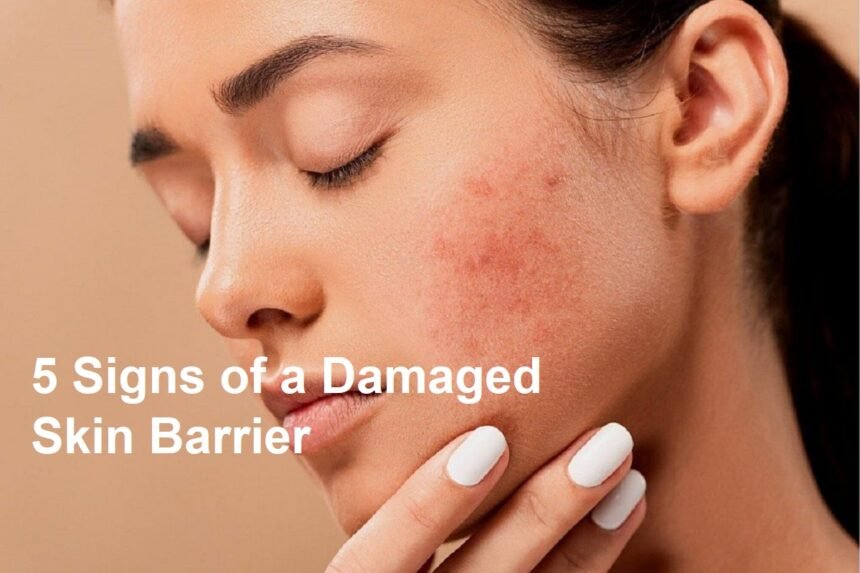Introduction
Your skin’s outermost layer, known as the skin barrier or the stratum corneum, plays a crucial role in protecting your body from harmful environmental aggressors, locking in moisture, and maintaining overall skin health. When this barrier becomes compromised or damaged, it can lead to a host of skin issues that affect both appearance and comfort. Recognizing the signs of a damaged skin barrier is essential for taking appropriate steps to restore its health. Here are five common signs that your skin barrier might be compromised.
1. Increased Skin Sensitivity
One of the earliest and most noticeable signs of a damaged skin barrier is increased sensitivity. Skin that previously tolerated products or environmental factors well may start to react with redness, burning, or tingling sensations. This heightened sensitivity can manifest after applying skincare products, during exposure to sunlight, wind, or cold weather, or even during normal routines like washing your face.
Why it happens:
A damaged barrier leaves nerves and blood vessels more exposed, making the skin more prone to reacting to irritants that would otherwise be harmless. Harsh ingredients like alcohol, fragrances, or exfoliants can exacerbate this sensitivity.
What to do:
Avoid irritating products, opt for gentle, fragrance-free skincare, and protect your skin from extreme weather conditions. Incorporate soothing ingredients like aloe vera, niacinamide, or ceramides to help repair the barrier.
2. Persistent Dryness and Flakiness
A compromised skin barrier cannot effectively retain moisture, leading to ongoing dryness, tightness, and flaky patches. Even if you moisturize regularly, your skin may still feel parched and look dull. This is because the barrier’s ability to lock in hydration is impaired.
Why it happens:
Damaged skin cells and weakened lipid layers make it difficult for your skin to hold onto water. As a result, moisture escapes easily, leaving skin dehydrated and flaky.
What to do:
Use rich, nourishing moisturizers that contain ingredients like ceramides, hyaluronic acid, or glycerin. Avoid harsh cleansers that strip natural oils, and consider applying occlusive agents, like petroleum jelly, for extra protection.
3. Breakouts and Skin Irregularities
Contrary to the belief that oily skin is only prone to acne, a damaged barrier can also cause breakouts. When the barrier’s integrity is compromised, it can trigger inflammation and disrupt the balance of good bacteria on the skin. This can lead to a resurgence of breakouts, redness, and uneven skin texture.
Why it happens:
A weakened barrier allows bacteria and pollutants to penetrate deeper into the skin, causing inflammation. Additionally, overcompensating with harsh skincare can further damage the barrier and exacerbate breakouts.
What to do:
Focus on gentle cleansing and barrier-repair products. Incorporate ingredients like niacinamide and zinc, which have anti-inflammatory properties. Avoid over-exfoliating or using aggressive acne treatments that can worsen the damage.
4. Redness and Irritation
Persistent redness, blotchiness, or a feeling of warmth are clear indicators that your skin’s protective layer is compromised. If your skin becomes easily irritated or inflamed, it’s a sign that the barrier is no longer functioning optimally.
Why it happens:
A damaged barrier exposes sensitive nerves and blood vessels, causing blood flow to increase and resulting in redness. Environmental triggers like UV rays, pollution, or wind can intensify irritation.
What to do:
Incorporate calming ingredients like centella asiatica, oatmeal, or chamomile into your skincare routine. Always wear a broad-spectrum sunscreen daily, and protect your skin from environmental stressors.
5. Visible Loss of Skin Elasticity and Radiance
Finally, a damaged skin barrier can lead to dullness and loss of firmness over time. When your skin isn’t properly protected or hydrated, it looks tired, saggy, and less luminous.
Why it happens:
Dehydration and inflammation impair collagen production, essential for skin elasticity and a youthful appearance. As the barrier becomes weaker, these issues become more prominent.
What to do:
Prioritize barrier-repairing treatments with ceramides, peptides, and antioxidants. Incorporate regular hydration, sleep well, and avoid lifestyle habits that accelerate skin aging.
Conclusion
Your skin barrier is fundamental to maintaining healthy, resilient skin. If you notice increased sensitivity, dryness, breakouts, redness, or dullness, your skin’s barrier may be compromised. Addressing these signs early by












